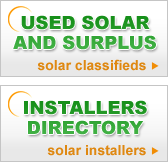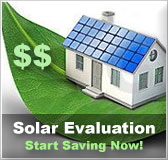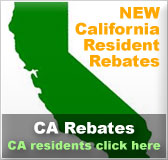
Home energy loan program:
-Through this program, residents of Maine may qualify for low interest
loans used for energy improvements.
-Eligible energy technologies for this program include; solar water
heat, biomass and geothermal heat pumps.
-Loans range from $2,800 to $30,000.
-Interest rates for these loans are fixed at 3.95%.
Solar and wind energy rebate program:
-The state of Maine offers rebates to residents who purchase and
install solar photovoltaics and solar thermal systems at home. Grid-tied
wind energy systems have also been added to this rebate program.
-Rebates for PV systems are set at $2 per watt with a maximum incentive
of $2,000. Rebates for solar thermal systems vary but typically are
either 25% of the project cost or $1,000 - $1,500. Rebates for wind
energy systems are $500 per 500 watts up to 2,000 watts without exceeding
$2,000.
-Qualifying systems must meet all specified requirements and standards.
Residential renewable energy tax credit:
-This personal tax credit allows the taxpayer to claim a credit of
30% of expenditures including labor costs and installation of qualified
residential solar-electric systems, solar water heating systems or
fuel cells. Small wind-energy systems and geothermal heat pumps can
also be accredited for.
-Solar-electric systems and solar water heaters have a maximum incentive
of $2,000 if placed in service before 2009. There is no maximum incentive
for systems placed after 2008.
-The excess amount of the federal tax credit may be carried forward
to the next taxable year if it exceeds tax liability.
-This can be carried forward until 2016, but after that, it is unknown
if the unused credit will be able to be forwarded.
Residential energy conservation subsidy exclusion:
-This is a personal exemption of 100% of energy conservation subsidies
provided by public utilities.
-The value of a purchase or installation of any energy conservation
measure by a customer such as solar water heat, solar space heat or
photovoltaics will not be included in the customer’s gross income.
-Customers of an electric utility company, who participate in the
utility’s energy conservation program, may receive a rate reduction
of electricity furnished or a nonrefundable credit against the purchase
price of the electricity on each monthly electric bill.
Energy-efficient mortgages:
-This is a federal loan program where homeowners can use EEM (energy-efficient
mortgages) to finance renewable energy technologies in a home.
Net metering:
-Net metering is available to residents who have renewable energy
equipment such as solar, wind, geothermal, biomass or hydroelectric
power that is capable of calculating the flow of electricity in two
directions.
-The net excess generation is given to the customer at the utilities
retail rate as a credit on the customer’s next bill.
-Maximum capacity is set at 660 kilowatts for investor owned utilities
and 100 kilowatts for consumer owned utilities.
-Qualifying systems must meet all efficiency requirements.










